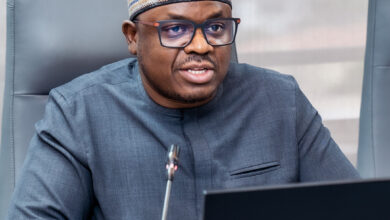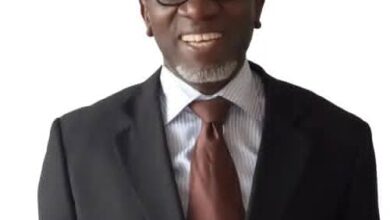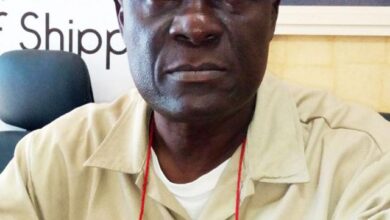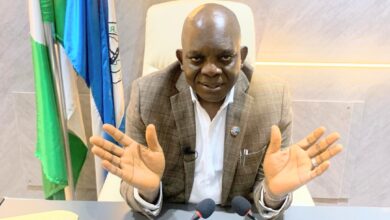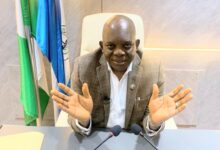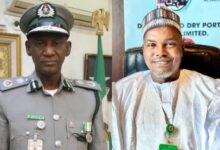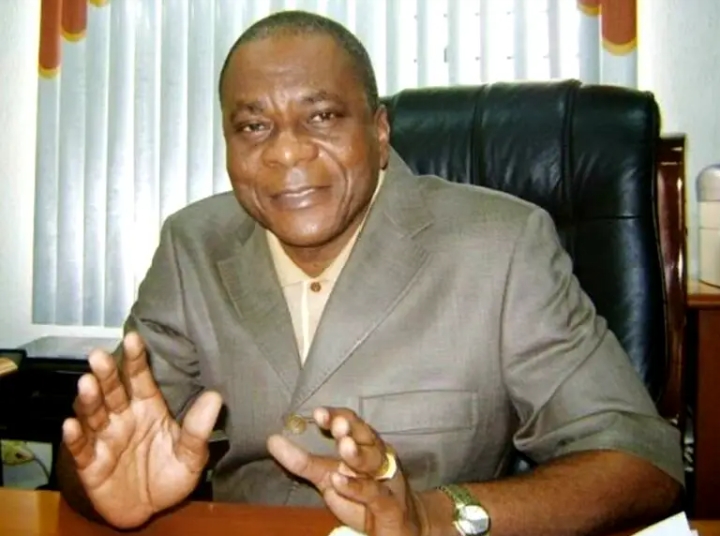
Lucky Eyis Amiwero a trade expert and an ace licensed customs agent says Nigeria failed to amend her laws that could have helped the economy grow
Except
How would appraise our port system and it’s performance last year and under the outgoing leadership of the country?
Well, 2002 has been a very terrible year. Let’s start from the process of law; the sector did not experience any reform by law. There was no law and in compliance with the legal issues, procedurally, the sector is not properly backed by law.
The Nigerian Ports Authority (NPA) act is just docile. Concession is not actually part of the law, and what you have is lease agreement. You have for instance, the NPA running a process whereby you have a contract and you don’t have a law backing up the contract.
I will believe after these eight years of the regime, those are the areas that people have to revisit, because you run a system where there is no law, and we still have a contract that is taking away the chunk of our freight components.
The multinationals have shipping companies and are involved in terminal operations. So invariably, they created the problem you have in the country today because the lease agreement they are calling concession was midwifed in 2006, you have various ports – some of them have 15 years, 10 some 20 or there about; and some of them have expired.
In all these, with the expiration since 2006 till now, you have a port system that is being driven without a law. That means you have a port system that is not regulated; the economic regulator which is commercial interest is not regulated; so you will find out that we have lost almost 60% of our freight components
A port process, whereby the terminal operators smile to the banks because nobody controls them and the shipping company. There is nowhere in the world you have this kind of port system, where procedure is not regulated.
Ghana for instance, the terminal operators are being regulated by the Ghana Shippers Authority and the Ghana Maritime Authority. Ghana Shippers Authority is actually highly involved in cargo process because they changed their law. The shippers’ council act all over the world is to protect shippers’ interest, but Ghana had to amend their act to accommodate the process of cargo.
They are involved in terminal handling, they can publish and remove the terminal handling charges and so many others. So Ghana Shippers Authority is in charge and they take care of the shipping company and terminal handling. It makes their port easier and better.
The elements of concession is still being handled by the Ghana Shippers Authority. So you have the Ghana Ports Authority working in agreement with the Shippers Authority. In our case you still have Nigerian Shippers Council, so you have a port industry whereby nobody regulates the economic interest. If you look at the cost of doing business in the Nigerian port, it is the highest in the whole world.
There are three components that make up an efficient port – the process of consistency, transparency and predictability; they are tools of facilitation which is missing in this country. You cannot predict when you will clear your containers or when the ship will berth. It is not consistent and also not transparent; you have multiple agencies, multiple charges and all the rest. It is being run like 1948 port; no regulator for the past eight years it has been very terrible.
After the 2006 reform, the port has been bedevilled with a lot of exploitative tendencies from every agency in the port. We operate one of the most terrible ports in the world where it is not consistent. When you look at the port access roads, you cannot access the port; you still have to put agencies in the port at a very serious cost to be able to check the inflow and outflow of cargoes in the port. Even with that, we still have a lot of problems because our port is not designed properly. We have a port city which is Apapa.
Apapa actually accommodates almost four ports – Apapa Port, Tincan, PTML and we have Kirikiri jetty (KLT). If you put all these cargoes in all four ports, it is supposed to be one of the biggest in the whole Africa. However, it is not so because of the way we operate the port without regulation or control, but we are still building more ports. You can be building all the ports, if you don’t have experts to redesign your port system, you will continue to have same problems.
You find out that some of the tools that are missing in the ports; even the new Lekki port is lacking one of the key tools which is the rail, the cheapest means to convey goods. You cannot be building ports without looking at multimodal transport system; it is very important.
You don’t need very massive ports, you need an efficient port, and the efficient port is actually driven on the basis of proper regulatory procedure, especially regulating the economic interest which has to do with overlapping of agencies. Not giving excessive power to terminal operators who are exploiting the system who decide what they want to do.
Nobody regulates them, same as the shipping companies. In America and Ghana you have people who regulate them, it is only this countries that has no regulating basis and this government has spent eight years without any new law.
It’s a waste of time and a very terrible thing to happen. This is a country that you are expecting to factor in the key tool of international process of trade facilitation and the African Continental Free Trade Area (AfCFTA). In the next one or two years, many of the consignment coming into the country will be free.
So when people are talking about free trade, you have a lot of agencies who don’t understand that you are not going to pay duties for the free trade, because when you have gone into continental agreement, you are talking about moving people, capital, and goods without procedural hindrance. Is the country ready for it?
Is Customs and other people ready? You bring people who don’t understand these things and they start speaking grammar, and you just laugh when you listen to them.
You have a country without a law regulating terminal operators and shipping company, and these are multinationals. When you look at most of them, like Maersk – APMT and Grimaldi – PTML, most of them are shipping companies that come into this country and become terminal operators and what are the benefits? What are the contributions to the GDP? Zero! Instead of going up, we go down.
Who regulates and monitors the conditions of the concession? This is a country run in a way that is terribly malfunctioning and components that actually attracts employment is moving out of the country.
Ships that are supposed to berth in this country are going to other countries to discharge and smaller vessels come in. The mother vessels discharge anywhere and then we become a secondary port, not a preferred port that controls the cargo. 75% of the cargo within the West African sub-region are Nigerian bound cargo, but distributed.
When you look at the channels, we have three layers of cargo – the domestic cargo coming directly; the transit cargo and you have the transhipment. In all these three layers, Nigeria is missing out of them. That is why you find out that there is unemployment in the country.
What attracts employment is the freight components. Nigeria pays for the freight; for every cargo that comes into this country. Nigeria is supposed to benefit from the freight, but are we? The freight is actually being shared by the multinationals and they are smiling to the bank, nobody controls them.
So we have very serious issues on our hands. We are missing out completely because when you have a full blown implementation of the AfCFTA agreement, then you will start to see the effect in our country.
We are just going to be transit zone; just a market, and most of the benefits of this continental free trade agreement will be to other countries who are prepared and have facilities and other things to support the trade.
When you look at the whole thing, Shippers Council has not moved from their old laws, the same with NPA and other agencies. All these things about the Senate committee on transport; finance and others ended up with just designing laws that are parochial, selfish and elitist in nature.
Many of these people will leave the assembly then come and face the problems later in life. I have been in the assembly fighting to make sure things are done properly, but unfortunately we have not done the best. There are a lot of issues that have to do with movement of cargo and we have missed it completely.
Our transit trade is being controlled by Ghana and Cote d’Ivoire. Transit trade is supposed to be controlled by landlocked countries and we have them around like Niger, Chad, Burkina Faso, Mali and they all don’t have ports; they use rail and are within our corridor. They are supposed to use our facilities to move their cargo because most of them are closer than Ghana and other places.
But because our procedures are not in line, they have to move to countries like Ghana. Ghana has facilities, their transit is being driven by satellite tracking system; their bonds are electronic bonds and they don’t carry guns moving from one place to another. They have dedicated berths for transiting goods to most of these landlord countries.
Let’s look at 2023. What in precise terms will you recommend for government to improve the port beyond what it is today?
The number one thing is that the port must be structurally designed. You cannot be operating ports the way they are operating these ports, you allow the shipping company and the terminal operations to operate the port for you. NPA have no powers over the port nobody controls anybody.
You are bringing a CG who has not seen CEMA; he doesn’t understand CEMA. You quote CEMA to him; he will say no that is not what it is supposed to be. You are bringing military to Nigeria Custom, is Customs a military arm?
Any government serious about growing the economy will not do that ?
Customs are trade procedural people that deal with WCO and WTO protocols. Does the man know anything about trade procedures? That is the problem. You put the man there for almost eight years and he has finished Customs.
Customs, NPA, Shippers Council are all gone. Go to Ghana and see what their customs is doing, then check our customs. You bring people who don’t know anything about a system and you say you put them there to fight corruption. Which corruption?
Nigerians participation in the shipping industry is also limited by funding, talking about access to cash to procure ships and other maritime platforms
No it is not limited; NIMASA is ‘eating’ that money. The Cabotage Act was a law that was designed in 2003, while NIMASA was established in 2007. The NIMASA Act under section 15, 16, and 17, you have what is called the maritime fund, which is for indigenous operators to build capacity; that is the essence of NIMASA, not to go and do seminar or talk about Deep Blue Project. No! Go and look at their core functions. And what are they using all those money to do?
The monies are used by NIMASA to run seminars and the rest at the end of the day the money is going. So what do you tell the people? The core function of NIMASA is to build capacity for indigenous operators, but which capacity have they built? And they are collecting the money.
Apart from that you have the maritime fund, go and look at the section there, it is very clear. They are talking about ship building fund, that one is quite different. You have the whole system being run as a personal institution. Is that what is done all over the world? It will be eight years since this administration came, have they distributed that money?
Contrary to the belief out there, the president does not have the power to approve or disapprove the disbursement of the Cabotage fund. There is no provision which says the president will approve it. Show me the provision of the law that says that. The money is not for the president, it is set aside for the indigenous operators.
No where do you have presidential approval, there’s nothing like that; check the law. What section in the Act do we have this? We just use ’the president said’ to cover up. Many of the things we are doing are not legal.
They have five months to go, can you set a quick maritime agenda for this administration before they go?
You cannot set any agenda for anybody; even for two years. These people have no focus; they don’t have anything to think about. Okay, tell me what they have done in the past eight years in the maritime sector? Forget the remaining months in their tenure, they are gone. From election in February to transition, there is nothing left.
Are you saying it hopeless now for this administration to achieve any quick win?
There’s no quick win, there’s nothing they can do again. The maritime sector is for experts, you don’t bring politicians to run that sector.
Under this administration, some critical maritime infrastructures were commissioned like the rail linking Abuja airport to the city ***
Have you gone there to see them working? It is not. As an operator you can go commission anything anytime, but let us see it working. I am involved; most of these people are not in the port. Who was Amaechi or Osinbajo, and all these people you are calling?
Are you saying the president was deceived to commission things that are not ready to function?
Ask them where it is functioning. How will you commission something that is not functioning and call that commissioning? When you commission something, it means that it is running immediately; you don’t politicise things. These are things you must take time to do. If tomorrow there is a change of government or something happened and they say let us investigate, money must have been allocated for all those things and they say ‘you as the president has done this, come and pay for it’ same for minister. All these must be accounted for whether you like it or not.
The CG came with a three point agenda to reform Customs, reorganise it and raise revenue. Now he will be ending his seven years as CG of customs, what is your assessment of his tenure, scoring him on a scale of 0 to 100?
The man has failed. He has done nothing. We made a reform package for the Nigeria Customs, but if you look at the service now, it has gone down extremely down, it was so bad you have scanners and you are just commissioning them now. Since 2013/2014, there were no scanners in the ports. You have the Customs that is not controlled by anybody and most of the things they are doing are not in line with the law. Do you call that success? Many of the companies have been killed by Customs because of the way they operate and don’t comply with the law. The man you put there is someone who doesn’t understand any procedure. He is a colonel, which is equivalent to Assistant Controller and an Assistant Controller is a procedure person. The man was just employed to shoot and kill and you bring him to come and take over a place like Customs, what do you expect him to do? Even people in Customs don’t understand Customs procedure; then you bring people who don’t know anything about Customs to come and overtake. Can you put a civilian to rule over the military? It is not possible and that is what you have done. They did it before with ***Ambu, we had to protest and he was removed; that is when you bring in professional Customs. And you said because the man is coming to fight corruption. What corruption? You are talking about revenue, how many companies have really survived if you look at the way Customs operates? How do you give them targets? You give them targets to overshoot and kill companies. Go and look at the ports, it is empty.
Many people thought a reformist administrator will have a limited time and hand over. Do you think it was wise running a reformist administration for seven years in the maritime sector?
I have never seen it anywhere in the world. What is he reforming? Is he a Customs expert? The man doesn’t know Customs. Have you not heard him talk? He has not been trained on Customs matter and doesn’t know anything about it, and you say he heads the Service for seven years. What do you expect the custom to do? Customs is a procedure – interpret, treat, classify and apply. Does he understand classification or valuation?
It’s not a political institution, it is a professional and technical institution and there are procedures in the port, you don’t bring in somebody as CG from outside the Service.
You bring in somebody from the rank of DCG and ACG, but he brought someone from outside; a contravention of the scheme of Service.
They say he is Buhari’s man, and that’s why the whole system is this way. Customs is not at all about revenue; it is about managing the economy and balancing






